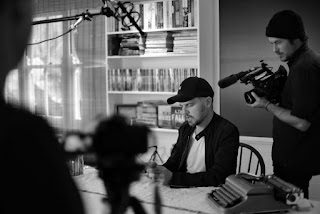Based in Queensland, Jenny Stubbs is a leading light in supporting children’s writers and illustrators and celebrating children’s literature. This week Jenny shares some of the amazing projects that she is involved with – you will be inspired and educated! Jenny is the President of Book Links, Coordinator of CBCA Qld Readers Cup and Director of StoryArts Festival Ipswich. She has been recognised for her commitment to literacy and engagement through reading and writing including winning the Dromkeen Librarians Award, the Dame Annabelle Rankin Award and the Johnno Award.
I wear a number of hats, but all of them are about promoting and supporting children’s literature.
As President of Book Links Qld, I look for opportunities to advocate for the establishment of a centre for children in Queensland based around story in all its forms. This organisation is a not-for-profit registered charity. We support emerging writers through our Write Links Group and provide reading lists, reviews and writing competitions for children and adults writing for children through our StoryLinks Group plus workshops for adults and children. Many resources can be found on the website.
 |
| © BookLinks. Used with permission |
We have a bustling program every year from Romancing the Stars where people ‘speed date’ a bunch of authors to a Literary Quiz at the end of the year where we raise money for other organisations such as IBBY and the Laureate Program with many other events in between. Some are recorded on ZOOM with free access via the What’s On tab.
There is an annual writer's mentorship with Dr. Robyn Sheahan-Bright with the winner from 2020, Benjamin Marshall, coming from Tasmania. We also run a biennial conference in October aimed at supporting writers and illustrators. This year we have Freya Blackwood, Sean Williams and Davina Bell included in the program to name a few. In 2021 we have introduced an award for Children’s Historical Fiction with lists published on the website and winner to be announced in October.
As President of the Ipswich District Teacher-Librarian Network I am busy in April and May helping to prepare our annual CBCA Book Week publication. We have been producing this since 1991 and it has been extremely popular. Because of Covid we changed it to a pdf format and will do it that way again this year. To support classrooms and libraries we add many free links and resources to our Book Week website which will include free graphics from our e-store. This year we are also offering some online art workshops based around the theme and some of the shortlisted books. Information is in our calendar and in the 2021 resources.
 |
© IDTL. Used with permission
The IDTL Network uses the funds raised from the sale of the book to run a free biennial festival for children with this year’s being held 2-6 August and a low-cost conference for adults 7-8 August. Anyone is welcome to attend.
 |
| © IDTL. Used with permission |
As a committee member of CBCA Qld branch, I coordinate the state-wide Readers Cup Competition. We have over 740 teams registered this year with teams taking part in regional competitions in May-June for years 5-6, 7-8 and 9-10. The winning teams will then travel to Brisbane in September for the State Finals. We have planned a day with three guest authors for them to meet before and after their competitions. The branch has also supported CBCA ACT last year and this year in helping them to establish a competition. They are tapping into our books and questions.
 |
| © Readers Cup. Used with permission |
Jenny Stubbs
Booklinks: https://booklinks.org.au/
Storylinks: https://booklinks.org.au/about-book-links/story-links/
Writelinks: https://booklinks.org.au/about-book-links/write-links/
Ipswich District Teacher Librarian Network: https://idtl.net.au/
StoryArts Festival: https://www.storyartsfestival.com/
Readers Cup: https://www.readerscup.org.au/
Editor’s note: I had the pleasure of meeting Jenny at a conference in Queensland in 2001 where I listened to her talk about Readers Cup. Reporting back to teacher librarians in Tasmania, the following year saw the first Readers Cup operating in Launceston, in the north of Tasmania. It has grown to become an event celebrated across the state. Many of our readers will also have used the IDTL Book Week resource every year - a wonderful resource to inspire Book Week activities.








